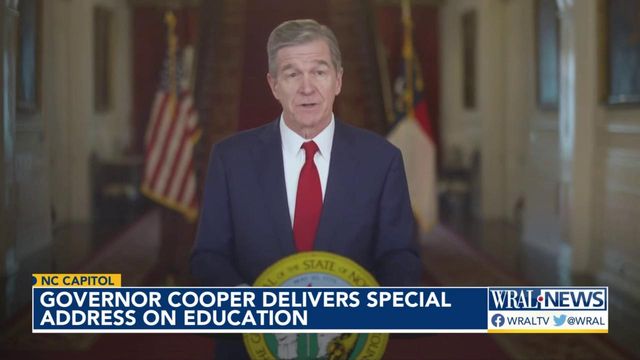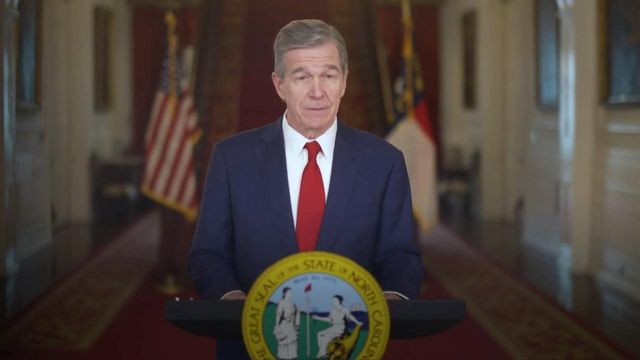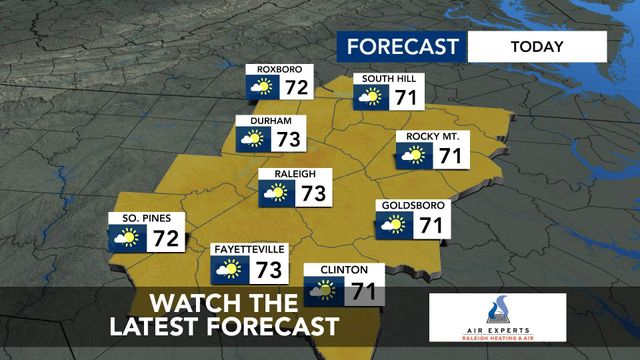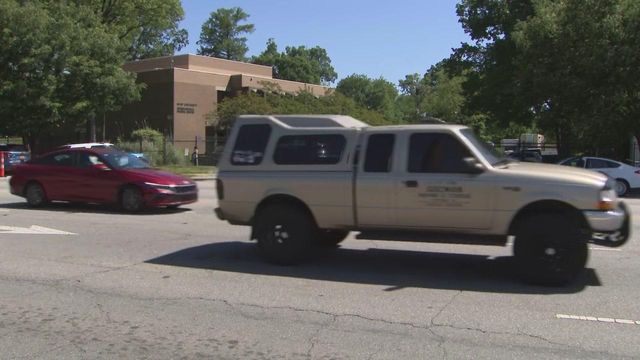Cooper says GOP teacher pay, voucher plans a public education 'disaster'
Democratic Gov. Roy Cooper launched a campaign Monday to try to beat back education and tax legislation from the Republican-controlled General Assembly that he said if enacted would crush North Carolina's public schools and wobble the state's economic future.
“It’s clear that the Republican legislature is aiming to choke the life out of public education,” Cooper said in a recorded speech released Monday. He urged voters to “take immediate action and tell them to stop the damage that will set back our schools for a generation.”
In his video address, Cooper said he's “declaring this a state of emergency” for public education but pointed out it was not an official order. He called on residents to encourage their legislators to reject a spate of GOP-backed education bills in the final weeks of the chief work period for this year’s legislative session. The legislature's agenda for the coming weeks includes passing a state budget for the year starting July 1.
The governor will hold public events across the state in the days ahead to rally parents, educators and business leaders.
Cooper said public school teacher pay proposals by Republicans fall way short and will fail to address a statewide teacher shortage. He argued deeper income tax cuts in the competing House and Senate budget proposals that also would benefit the highest wage earners would ultimately empty state coffers.
At the same time, the GOP is moving to dramatically expand the state’s K-12 private school scholarship program so that families of any income level could receive financial assistance, not just the poor and middle class.
That expansion ultimately would send over $500 million in taxpayer money annually to the Opportunity Scholarship Program. In contrast, the governor said, the Senate budget would raise base salaries for some veteran teachers by just $250 over two years.
"That’s slap in the face, and it’ll make the teacher shortage worse," Cooper said, adding that public school superintendents are telling him they'll brace to make cuts to programming as possible budget cuts loom. That could include extra academic programming, such as Advanced Placement courses, and after-school activities, including sports.
“(The General Assembly leadership) have clearly given up on the public schools and have decided to fund private schools instead,” Cooper told the Associated Press.
Republicans point out that public education spending would grow by several hundred million dollars a year annually in their competing plans. And GOP leaders consider expansion of the private-school vouchers program part of a philosophy to give all children access to education options — whatever the source — to help them succeed.
Rep. Tricia Cotham of Mecklenburg County, whose recent party switch from Democrat to Republican gave the GOP veto-proof seat majorities in both chambers, dismissed Cooper's speech as “political theater.”
“The true emergency here is that the governor is advocating for systems rather than students themselves,” Cotham said in a statement. “Education is not one-size-fits-all, and North Carolina families should have the freedom to determine what kind of education is best for them.”
Randy Brechbiel, a spokesperson for Senate leader Phil Berger, shared similar criticism, noting that “meaningless publicity stunts do nothing to improve educational outcomes in our state.”
Cooper's use of the gubernatorial bully pulpit comes as his power to confront the legislature has been weakened significantly in the weeks since Cotham switched parties. He said he would have issued the clarion call for education even if he had sizable legislative support to uphold his veto because education is critical to the state's fiscal health. The public school system is often the largest employer in rural counties and prepares students for the workforce.
“The general public doesn’t realize the disaster that is brewing,” Cooper told the AP.
Cooper is opposing:
- Proposed tax cuts for wealthier residents (House Bill 259, which has different versions in the House and Senate)
- A major expansion of vouchers for students to attend private schools, regardless of their family income. The Office of State Budget and Management estimates public schools would lose more than $200 million by the 2026-27 school year under the plan, as they also lose students. (House Bill 823 and Senate Bill 406)
- Switching State Board of Education seats from governor appointments to partisan elected positions (House Bill 17)
- Shifting the authority to set course standards away from the Board of Education, which uses a large stakeholder process to develop standard recommendations, and to a board appointed by lawmakers and the governor and including the state superintendent (House Bill 756)
- Banning certain ideas from being taught in school related to race and sex, including teaching that one group has privilege over another. Critics of the bill argue it includes enough gray area that teachers will feel uncomfortable even discussing race or sex in the context of history. (House BIll 187)
- A bill, called the “Parents' Bill of Rights,” that would expand administrative requirements for responding to parents or proactively releasing information on course materials, though it does not come with additional personnel or funding. It would also require schools to notify parents if their child is questioning their gender identity, which opponents of the bill argue is tantamount to outing a child without their consent. (Senate Bill 49)
The House proposal would raise average teacher pay by 10.2% over two years, compared to 4.5% in the Senate plan, which would lag behind recent inflation rates. Cooper’s budget proposal wanted 18% average raises.
The governor also accused legislators of doing little to expand the state's prekindergarten program for at-risk children and to stabilize child care centers.
And he's also worried about a proposed constitutional amendment that if placed on the ballot would remove his ability to appoint nearly all members of the State Board of Education. Members would be picked in district elections instead.
“If they get their way," he said in his speech, "our State Board of Education will be replaced by political hacks who can dictate what is taught and not taught in our public schools.”
Mixed opinions on vouchers
Vouchers toward private school tuition, under the proposed bills, would expand from $133.3 million this year to well more than $500 million over the next decade, becoming one of the largest education-related line items in the state budget.
At least half of the new funding would go toward lower-income families, likely new voucher recipients. The other half could be used for anyone of any income, including for children who already attend a private school. Currently, the voucher program is only for lower-income families and for children either just entering school or transferring from a public school.
Under the bills, the lowest-income families would receive more than $7,000 in a year, while the wealthiest would receive more than $3,000 in a year, starting in the 2024-25 school year.
Republican sponsors of the private school voucher bill argue more of the state’s children need access to private schools and that families already attending private school should receive vouchers, too, as taxpayers.
Democrats have opposed the bills, arguing public schools need more investments and that private schools don't have to accept every student or meet certain state or federal requirements.
Public schools are funded mostly on a per-student basis. So for every public student who left to attend a private school, the school could lose about $12,000 in funding, depending on the school.
Private school vouchers, called Opportunity Scholarships in North Carolina, are checks written by the state, on behalf of qualifying families who apply for the voucher, to a private school. The child must apply to the private school and be accepted to qualify.
Most of North Carolina's private school vouchers go toward tuition at religious schools, mostly Christian schools.
North Carolina has comparatively lax regulations for private schools, said Jane Wettach, a retired Duke University law professor who has studied the state's voucher program. It also doesn't track the outcomes of students who use the vouchers to leave a public school for a private one, she said.
Wettach noted that most states don't have private school voucher programs.
Just West Virginia, and now Florida, have voucher programs that are available to families of all income levels. It's too early to assess the impact of the programs, which have yet to be fully implemented.
A handful of state have universal education savings accounts, rather than voucher programs, said Bob Luebke, director of the John Locke Foundation's Center for Effective Education. Families can use those funds for any educational expenses, including private school tuition.
It's difficult to precisely estimate the potential financial impact of the voucher expansion, Luebke said, because it depends on where the private schools will open and how many students will leave a specific public school. More private schools may need to open before all of the $400 million more in private school funding can be used.
But opponents of the expansion take issue with the money that would, if the bill passed, fund private school tuition for students already attending a private school.
"The North Carolina Constitution tells the legislature that it has the obligation to support and maintain public schools," Wettach said. "It doesn't say anything about supporting private schools or students who are going to private school."
Luebke takes issue with Cooper opposing tax cuts for wealthier residents as a part of his argument.
"(He's) talking about tax cuts for the rich, and he states his opposition to them," Luebke said. "But at the same time, he trots around North Carolina at one of these grand openings of companies that he's lured to North Carolina primarily with tax incentives."
A 'sound basic education'
Over the next two years, Cooper supports a multi-billion education plan, commonly known as the "Leandro Plan."
It's an agreement between the state — including Cooper — and families and school boards in five lower-income counties. Those families and school boards sued the state in 1994, alleging the state did not give the school boards what they needed to provide students with a "sound basic education," as promised in the North Carolina Constitution.
The North Carolina Supreme County has sided with the families and school boards and upheld an order in that case to increase education spending by at least $4.5 billion five years from now.
That would fund more school employees and more services to support students and schools, particularly for students with disabilities and disadvantaged students. It would also drastically increase funding for pre-kindergarten and early childhood education.













